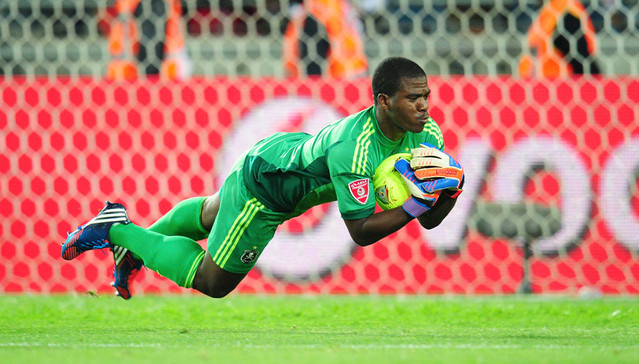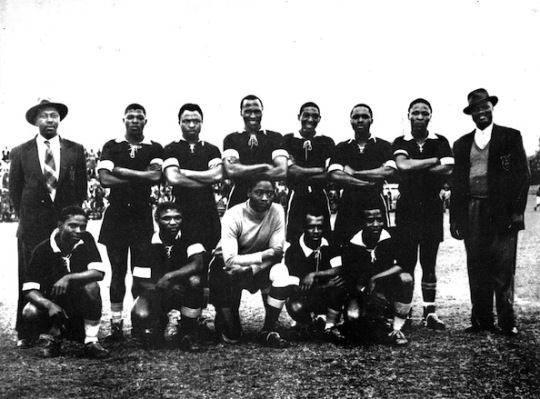
Photo: Durban & District African FA select team, Rhodes Centenary tournament, Salisbury, Rhodesia (1953)
Football is Coming Home is pleased to receive and publish a guest essay by Zipho Dlangalala, a South African fútbologist who has coached players and trained coaches for many years at all levels. He is a teacher by profession. It has been lightly edited for style.
Guest Post by Zipho Dlangalala (makhandaz@hotmail.com)
KWAZULU-NATAL—All sports are played in, and influenced by, past and present social conditions. This is largely, if not entirely, because sport is played by people who are social beings.
When we see most of our South African players playing the same way, looking like identical midfielders, we should know instantly that we are looking at them with “foreign eyes.” They will always look like that as long as we evaluate them with foreign tools and criteria.
To African eyes, it is those midfield players that should reveal the nature and inclination of our players. Their creativity and desire to care for the ball—the uninhibited attraction to artistic modes of play—are great assets that we should have treasured so that their game exhibits the same attributes found in them naturally, at least before being diluted.
Regrettably, the Apartheid philosophy and its legacy was too strong for most of us. Based on seeing life through Master-Slave, Boss-Subordinate, Superior-Inferior, Rich-Poor, Educated-Illiterate, Advanced-Primitive, civilized-uncivilized relationships, this “baaskap” paradigm has engulfed us. Even when we know it is not desirable, we often find ourselves promoting it, advocating on its behalf through actions more than words.
It makes us feel acceptable and progressive to be seen as “the master.” We do everything and anything to feel accepted and to get approval from those who represent “the master” perspective. It has been engraved in us to look for this approval, otherwise we feel we do not have the capacity to stand by ourselves and achieve success on our own. The desire to be associated with, to be affiliated to, approved by, “the master” is hard to resist for most. It is this prevailing mentality in South Africa that undermined indigenous cultures, languages, restricted people’s movement and freedom to associate, to think, to explore, to design, to invent, to discover.
It is a “total control” approach of life. It attempts to control what people think and learn. Given the slightest opportunity, it dictates LIFE to each and every person who is supposed to be subordinated (and limited) to its wishes and desires.
In a cultural and socio-economic environment shaped by a social hierarchy long based on race, fertile ground exists for past tendencies to endure. The more things change, the more they stay the same.
Football under these conditions cannot be sustained, let alone developed.
Looking at football through a particular lens inevitably results in the game looking in a particular manner. Are we using proper African perspectives to look at the game as it is in Africa? Are our views coloured to give us a special feeling? Are we ready to bring something new to world football or are we content to follow established paths and continue to consume what is already in the market? We are entrepreneurs and have skills. We need to develop them and show our own ideas to the world. We need to create something new in our football for the world to sit up and take note.
Tag: South Africa
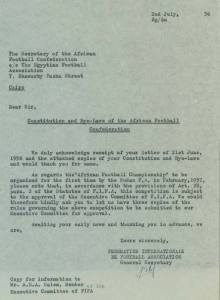
The 2015 African Nations Cup begins on January 17 in Equatorial Guinea. The oil-rich dictatorship, a former Spanish colony with a population of 736,000, agreed to host the tournament on short notice after Morocco pulled out due to fears related to the Ebola outbreak in West Africa.
Africa’s most important tournament is organized by the Confederation of African Football (CAF), a trailblazing pan-Africanist institution born at the dawn of the era of decolonization. Joining the world body, as I’ve written elsewhere, was an honorable, quick, and inexpensive way for newly independent nations to assert their full membership in the international community.
CAF took tangible shape at the 1956 FIFA Congress in Lisbon. There, delegates from Egypt, Sudan, and South Africa convened to draft a constitution and by-laws. The men also decided to organize a continental championship. Ethiopia was also involved in the discussions, but Yidnecatchew Tessema was unable to travel to Lisbon. The African proposal was later sent to FIFA for review and approval (see image at left).
On February 8, 1957, football officials from Sudan, Egypt, Ethiopia, and South Africa convened at Khartoum’s Grand Hotel to formally launch CAF. Fred Fell, a white man representing apartheid South Africa, was invited because his country was a member of FIFA and the Africans did not wish to be perceived as undiplomatic. In the meantime, the white South African football association gingerly debated the composition of the national team. However, the authorities Pretoria opposed a mixed selection and the white football establishment did not challenge the policy.
There are conflicting accounts about what happened next. CAF officials stated that they promptly excluded South Africa in a show of unequivocal pan-African solidarity. Fell and white South African football put forward a different story: they claimed they withdrew the team prior to any sanctions due to the team’s impending tour to Europe as well as security concerns linked to the ongoing Suez Crisis. Unfortunately, the minutes of the meeting at CAF were later destroyed in a fire so we may never know the exact truth of the matter. What is certain is that the South African issue did not disappear. To the contrary, the struggle against apartheid in football would become a powerful bond that united CAF and nearly all African nations for three decades.
South Africa’s absence in 1957 meant that only three teams, comprised of amateurs, participated in the inaugural African Nations Cup. Ethiopia, which had been drawn to play against South Africa, received a bye into the final. Egypt defeated hosts Sudan 2–1 and then dispatched Ethiopia 4–0 in the final watched by a crowd of 30,000 at the Stade Municipal. All four goals were scored by striker Mohammed Diab El-Attar “Ad Diba.” “Those were unforgettable matches,” Ad Diba recalled in an interview in 2001. “The success of this championship and its popularity amongst the Sudanese encouraged the African federation to organize a tournament on a biennial basis and to be played in a different country each time,” he said. Ad Diba made history again eleven years later in Addis Ababa, when he refereed the Afcon final between Congo (DRC) and Ghana (see video).
In those early days, CAF brought to life Kwame Nkrumah’s dream of a United States of Africa. At the same time, football provided a rare form of national culture, unity, and pride in postcolonial Africa.
Today, the African Nations Cup has transformed itself into a globalized commercial event with multinational corporate sponsors, matches on satellite television and online, many European coaches, and most players on the sixteen squads employed by European clubs. It is a far cry from 1957. And yet an alluring contradiction has endured: the Afcon showcases Pan-African solidarity while triggering 90-minute nationalism.
Just two days after former 800m world champion Mbulaeni Mulaudzi died in a car crash, South Africa mourns the death of another sport celebrity. 27-year-old Senzo Meyiwa, captain of Orlando Pirates and South Africa, was shot and killed on Sunday evening during a robber at his partner’s home in Vosloruus, East Rand.
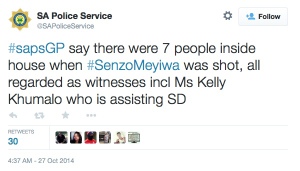 According to initial reports, two armed men entered the home of actress and singer Kelly Khumalo and demanded cash, cell phones, and valuables from seven people. An altercation ensued and one of the assailants shot Meyiwa once in the chest. The player was pronounced dead on arrival at the hospital.
According to initial reports, two armed men entered the home of actress and singer Kelly Khumalo and demanded cash, cell phones, and valuables from seven people. An altercation ensued and one of the assailants shot Meyiwa once in the chest. The player was pronounced dead on arrival at the hospital.
Kick Off magazine reported on its website that “News of the shooting prompted widespread sympathy on social media and condemnation of South Africa’s rampant gun violence.”
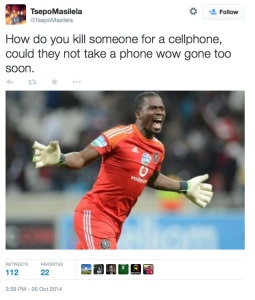 Tsepo Masilela, a Bafana Bafana teammate of Meyiwa’s, seemed to capture the shock of many when he tweeted: “How do you kill someone for a cellphone?”
Tsepo Masilela, a Bafana Bafana teammate of Meyiwa’s, seemed to capture the shock of many when he tweeted: “How do you kill someone for a cellphone?”
The South African Police Service (@SAPoliceService) offered a R150,000 reward for information leading to an arrest.
Chris Thurman, an academic and editor of Sport versus Art, summed up the horrible past days for sport in South Africa via Twitter: “RIP Mbulaeni Mulaudzi & Senzo Meyiwa. Men who offered South Africans two of the best features of our story, struck down by two of the worst.”
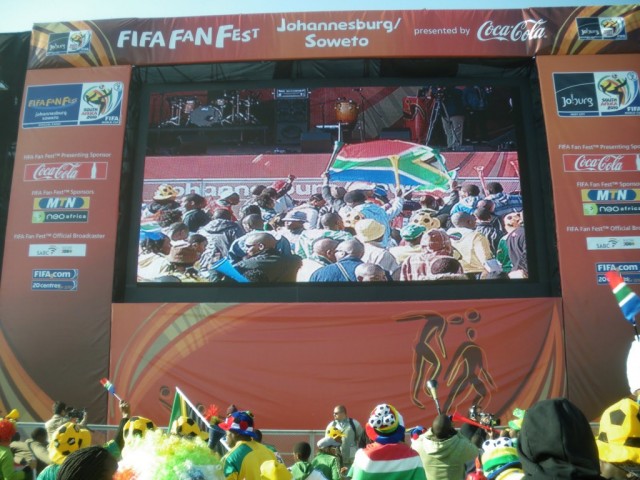
Quinton Fortune played seven seasons with Manchester United and 46 times for South Africa. On September 23, he wrote an excellent piece in The Guardian about a topic dear to me and to many readers of this blog: the impact of the 2010 World Cup on the growth and development of South African football.
Given the billions of rands spent on new and revamped stadiums and transport infrastructure, Fortune asks, was hosting the tournament a boon for the local game? “Judging by the poor attendances at top-flight games not involving the country’s two most popular clubs, Kaizer Chiefs and Orlando Pirates, who are also by far the most powerful in financial terms, and the poor performances of the national team Bafana Bafana, the answer unfortunately has to be a resounding ‘no’,” Fortune writes.
His concerns are numerous, important, and inter-related. The World Cup, Fortune asserts, did nothing to alter the Chiefs-Pirates duopoly, which continues to capture the lion’s share of the attention from fans, media, and sponsorship money. He points out that the quality of play in the Premier Soccer League is not terribly good, as evidenced by last year’s top scorer, Bernard Parker, boasting a meager 10 goals.
Fortune then notes how the swanky World Cup stadiums in Cape Town, Nelspruit, Polokwane, and Port Elizabeth are now massive financial drains on local municipalities struggling to deal with many pressing social needs in perhaps the most unequal country in the world.
The former Man United midfielder does not spare the PSL’s satellite broadcaster, SuperSport, which bankrolls the South African league while offering 24/7 matches and highlights of European football (such as EPL, La Liga, Serie A, Champions League). This contradiction is another reason why the PSL is “losing fans who prefer to watch the football from the comfort of their homes, receiving high definition pictures, while also having a choice of watching (better quality) football from other parts of the world,” says Fortune.
The way forward, Fortune concludes, requires harnessing South Africa’s world-class infrastructure and abundance of football talent to forge “a well-planned development programme which will develop that talent into realising its full potential.” How this should be done is the challenging part.
Part 2 of my interview with Boyzzz Khumalo (part 1 is here) opens with a description of the harrowing injury that prematurely ended his Major League Soccer career.
Boyzzz reflects on the inherent fragility of professional sports, the importance of higher education for life after soccer, and his extensive youth coaching experiences in both Soweto and in Michigan.
Boyzzz’s deeply personal commitment to community upliftment comes through in a detailed discussion of the challenges and hopes for the Umhlaba Vision Foundation. Anyone interested in getting involved or learning more about Umhlaba can send email to boyzzzkhumalo80 AT gmail.
Boyzzz Khumalo: From Soweto to Michigan
Thabiso “Boyzzz” Khumalo grew up in Soweto, South Africa, around the corner from the homes of two Nobel Peace laureates: Nelson Mandela and Archbishop Desmond Tutu. Like so many boys in the land of apartheid, he spent every moment of free time playing soccer and dreaming of becoming a professional player overseas. Unlike most of them, however, Boyzzz fulfilled his dream
On July 22, I sat down with Boyzzz for an interview on the campus of Michigan State University. We’d been hoping to do an interview ever since we met in November 2013 when he visited my “Sport in African History” seminar for a screening and discussion of Invictus.
This week was an especially opportune time to chat about Boyzzz’s sporting life because on Sunday, July 27, Lansing United, his current team, travels east to New Jersey to play a National Premier Soccer League semifinal against New York Red Bull Under-23.
How does a young man from Soweto end up playing in Michigan? In part 1 of our interview, Boyzzz shares memories of anarchic pickup games in Soweto; his first experience in the U.S. during a youth tournament that would change his life; and then scoring his first MLS goal for DC United.
Boyzzz also discusses the work of the Umhlaba Vision Foundation–a nonprofit organization he founded in 2007 with two South African friends. The goal of Umhlaba (meaning “world” in the Zulu language) is to change the lives of young Sowetans by creating a positive development environment through sport and education and bringing student-athletes to the United States. For more information about the foundation please email Boyzzz (boyzzzkhumalo80 AT gmail).
Don’t forget to come back tomorrow for part 2 of the interview!
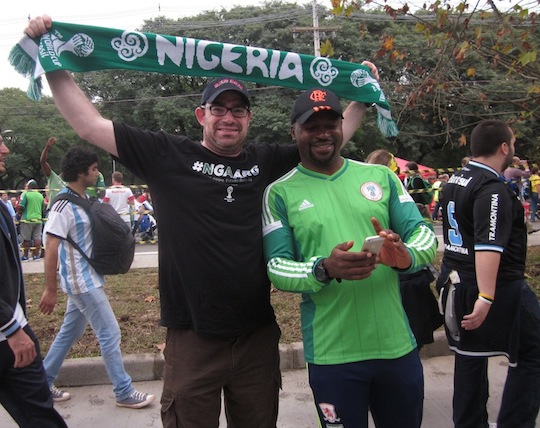
Guest Post by *Derek Charles Catsam
I recently returned from the 2014 World Cup in Brazil. It was a remarkable experience in a beautiful country. Everywhere we went people were gracious, joyful hosts. We ate fantastic churrasqueira (the Brazilian barbecue that will fuel my dreams for months) and drank among friends. The games were tremendous, the colorful visiting fans (with special mention to the dancing, chanting, singing, drinking Argentine throngs) made the World Cup the event that it is. The protests were more intermittent than expected. But the issues raised were as valid as ever.
I was based in Porto Alegre in the state of Rio Grande do Sul on Brazil’s southern border with Uruguay and Argentina. I attended four matches in Estadio Beria-Rio, the home of Sports Club Internacional: France-Honduras, Algeria-South Korea, Argentina-Nigeria, and the round of 16 match pitting eventual champions Germany against the Algeria. With 32 teams competing, the first two weeks of the World Cup are an unparalleled Carnival of Nations. Porto Alegre was in the midst of a Brazilian winter, hardly freezing, but occasionally raw and damp. The bikinis and swimming shorts that many of you saw as the regular going-to-commercial interludes on ESPN were many hundreds of miles north.
The tournament, which equaled the most goals (171) ever scored in a World Cup, was spectacularly entertaining and Germany is certainly a worthy champion. But once the confetti cleared, the last drinks were downed, tourists returned home, and Brazilians shook off the shameful way the Seleção flamed out of the tournament (and I do not for one second believe that the presence of Thiago Silva and Neymar against Germany and the Netherlands would have made much difference—Brazil’s problems were systemic) a familiar question looms: Was hosting the World Cup worth it?
